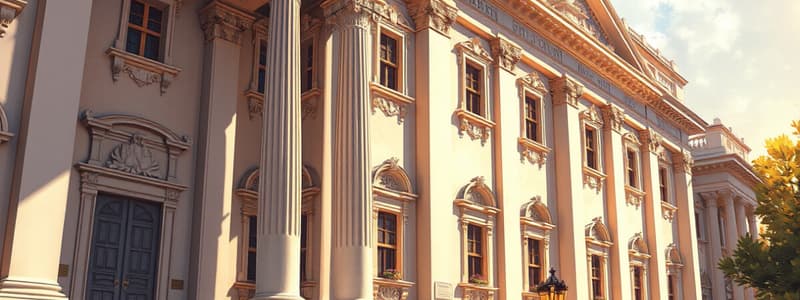Podcast
Questions and Answers
What style is produced by the neoclassical movement that began in the mid-18th century?
What style is produced by the neoclassical movement that began in the mid-18th century?
- Baroque
- Gothic
- Rococo
- Neoclassical (correct)
What are the styles that happened at the same time as Neoclassicism?
What are the styles that happened at the same time as Neoclassicism?
Regency (England), Empire (France), Federal (US), Biedermeier (Germany)
What period does 'Directoire' describe?
What period does 'Directoire' describe?
- Neoclassicism
- Late Baroque
- Post-Revolution French Directory (correct)
- Rococo
Who was Napoleon Bonaparte?
Who was Napoleon Bonaparte?
What is the Late Georgian Style?
What is the Late Georgian Style?
What does Regency refer to in terms of architecture?
What does Regency refer to in terms of architecture?
What is Jeffersonian style?
What is Jeffersonian style?
What defines the Greek Revival style?
What defines the Greek Revival style?
Who was George Hepplewhite?
Who was George Hepplewhite?
Who are the big three English furniture makers of the 18th century?
Who are the big three English furniture makers of the 18th century?
What is Thomas Sheraton known for?
What is Thomas Sheraton known for?
What is the American Federal Style?
What is the American Federal Style?
Study Notes
Neoclassicism Overview
- Neoclassical movement began in the mid-18th century as a reaction against the Rococo style.
- Architecture draws heavily from Classical Greek styles and the Italian architect Andrea Palladio.
- Emphasizes wall over chiaroscuro and maintains distinct identities for every architectural component.
Concurrent Styles
- Key styles emerging alongside Neoclassicism:
- Regency (England)
- Empire (France)
- Federal (US)
- Biedermeier (Germany)
Directoire Style
- Associated with post-Revolution France (1795-1799).
- Features minimal carving, planar veneers, and neoclassical architectural forms.
- Anticipates the Empire style that follows.
Napoleon Bonaparte
- Born 1769, died 1821; significant French military and political leader.
- Served as Emperor of France from 1804 to 1815.
- Influenced legal systems through the Napoleonic Code.
- Known for military strategy in the Napoleonic Wars and expanding French hegemony in Europe.
Late Georgian Style
- Architectural styles in English-speaking countries from 1720 to 1840.
- Named after the first four British monarchs of the House of Hanover, reigning from 1714 to 1830.
Regency Style
- Characteristic of British architecture in the early 19th century.
- Mirrors Biedermeier in Germany and Federal style in the US.
- Known for white stucco facades, elegant entries with columns, and elements like wrought iron balconies.
Jeffersonian Style
- American Neo-Classicism influenced by Palladio.
- Prominent in early America (1790s-1830s) with designs like Monticello and University of Virginia.
Greek Revival Style
- Architectural movement from the late 18th to early 19th centuries, mostly in Northern Europe and the US.
- Considered the final phase of Neoclassical architecture influenced by Hellenism.
George Hepplewhite
- Active between 1727 and 1786; noted cabinetmaker and a leading figure in 18th-century English furniture.
- Associated with elegant, light furniture style; characterized by a shield-shaped chair back.
The Big Three Furniture Makers
- The leading English furniture makers of the 18th century are:
- George Hepplewhite
- Thomas Sheraton
- Thomas Chippendale
Thomas Sheraton
- Lived from 1751 to 1806; known for early 19th-century furniture design.
- Furniture styles reflect classical architecture principles, essential for the designer’s training.
American Federal Style
- Classicizing architecture in the US during 1780 to 1830.
- Represents a blend of neoclassical influences adapted to American context.
Studying That Suits You
Use AI to generate personalized quizzes and flashcards to suit your learning preferences.
Description
Dive into Neoclassicism with these flashcards from INTD 359 Chapter 17. Explore the key concepts and figures that define this architectural movement, emphasizing the style that emerged as a reaction to Rococo. These flashcards will solidify your understanding of the influences and characteristics of Neoclassical architecture.




